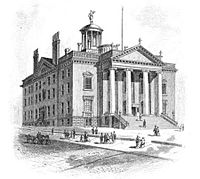57th New York State Legislature
| 57th New York State Legislature | |||||
|---|---|---|---|---|---|
|
|||||

The Old State Capitol (1879)
|
|||||
| Overview | |||||
| Jurisdiction | New York, United States | ||||
| Term | January 1 – December 31, 1834 | ||||
| Senate | |||||
| Members | 32 | ||||
| President | Lt. Gov. John Tracy (J) | ||||
| Party control | Jacksonian (25-7) | ||||
| Assembly | |||||
| Members | 128 | ||||
| Speaker | William Baker (J) | ||||
| Party control | Jacksonian | ||||
| Sessions | |||||
|
|||||
| 1st | January 7 – May 6, 1834 |
|---|
The 57th New York State Legislature, consisting of the New York State Senate and the New York State Assembly, met from January 7 to May 6, 1834, during the second year of William L. Marcy's governorship, in Albany.
Under the provisions of the New York Constitution of 1821, 32 Senators were elected on general tickets in eight senatorial districts for four-year terms. They were divided into four classes, and every year eight Senate seats came up for election. Assemblymen were elected countywide on general tickets to a one-year term, the whole Assembly being renewed annually.
At the time of the state election in 1833, there were three political parties: the Jacksonian Democrats, the Anti-Masonic Party, and the National Republican Party. The latter two parties had formed an Anti-Jacksonian bloc at the previous election.
The State election was held from November 4 to 6, 1833. State Senators Thomas Armstrong (7th D.) and Albert H. Tracy (8th D.) were re-elected. Leonard Maison (2nd D.), John C. Kemble (3rd D.), Isaac W. Bishop (4th D.), Ebenezer Mack (6th D.); and Assembly Speaker Charles L. Livingston (1st D.) and Assembly Clerk Francis Seger (5th D.) were also elected to the Senate. Tracy was an Anti-Jacksonian, the other seven were Jacksonians.
The Legislature met for the regular session at the Old State Capitol in Albany on January 7, 1834; and adjourned on May 6.
William Baker (J) was elected Speaker unopposed.
...
Wikipedia
